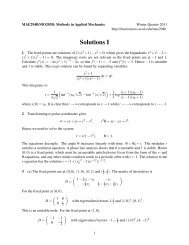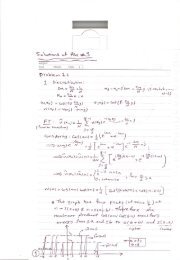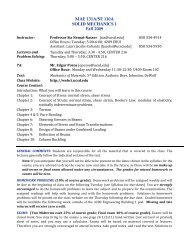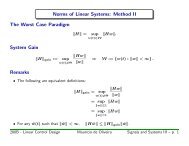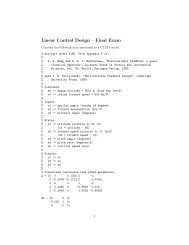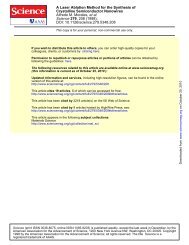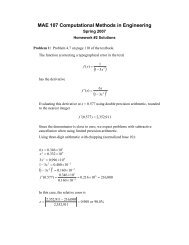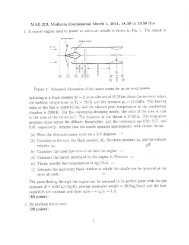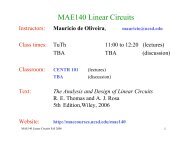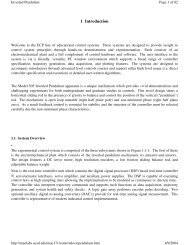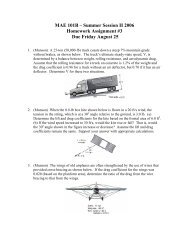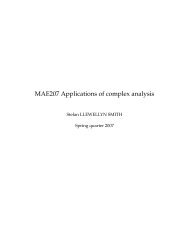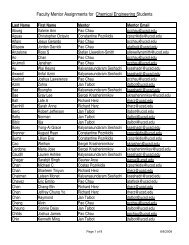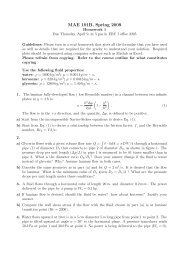- Page 1 and 2: GROUNDWATER RESOURCES PROGRAM Groun
- Page 3 and 4: Groundwater Availability of the Cen
- Page 5 and 6: Foreword An adequate supply of grou
- Page 7 and 8: Contents Chapter A Introduction, Ov
- Page 9 and 10: Chapter C Numerical Model of the Hy
- Page 11 and 12: Figures Chapter A Figure A1. Map of
- Page 13 and 14: Figure B12. Map of altitude of the
- Page 15 and 16: Figure C28. Pie chart and histogram
- Page 17 and 18: Conversion Factors Inch/Pound to SI
- Page 19 and 20: Chapter A. Introduction, Overview o
- Page 21 and 22: - - precipitation. -
- Page 23 and 24: 40° 39° 38° 37° 36° 35° Klama
- Page 25 and 26: Texture Model DATA Centralized Geos
- Page 27 and 28: Hydrology Water Well Information Aq
- Page 29 and 30: Table A1. Water-balance subregions
- Page 31 and 32: B Red Bluff 0 50 100 Miles 0 50 100
- Page 33 and 34: Delta and Eastside Streams ).
- Page 35 and 36: for about 30 percent of the annual
- Page 37 and 38: 0 50 100 Miles 0 50 100 Kilometers
- Page 39 and 40: A Coast Ranges Clayey lenses Fault
- Page 41 and 42: - the distribution of these pro
- Page 43 and 44: C DEPTH TO MIDPOINT OF INCREMENT, I
- Page 45 and 46: ). The southern part, referred , in
- Page 47: 3-D Model of Percentage of Coarse-G
- Page 51 and 52: C Layer Corcoran Clay EXPLANATION C
- Page 53 and 54: E Layer 9 EXPLANATION Central Valle
- Page 55 and 56: Geomorphic province— Basin Delta
- Page 57 and 58: San Joaquin Valley ),
- Page 59 and 60: - Water supplied from aquifers
- Page 61 and 62: C Figure A16. Continued. 3.54% 5.45
- Page 63 and 64: CUMULATIVE DEPARTURE OF PRECIPITATI
- Page 65 and 66: CUMULATIVE DEPARTURE OF STREAMFLOW
- Page 67 and 68: 700 500 600 400 200 160 0 50 100 Mi
- Page 69 and 70: B 0 50 100 Miles 0 50 100 Kilometer
- Page 71 and 72: Water Budget per year (
- Page 73 and 74: References Cited 55 -
- Page 75: References Cited 57 - - 2009, at
- Page 78 and 79: 60 Groundwater Availability of the
- Page 80 and 81: 62 Groundwater Availability of the
- Page 82 and 83: 64 Groundwater Availability of the
- Page 84 and 85: 66 Groundwater Availability of the
- Page 86 and 87: 68 Groundwater Availability of the
- Page 88 and 89: 70 Groundwater Availability of the
- Page 90 and 91: 72 Groundwater Availability of the
- Page 92 and 93: 74 Groundwater Availability of the
- Page 94 and 95: 76 Groundwater Availability of the
- Page 96 and 97: 78 Groundwater Availability of the
- Page 98 and 99:
80 Groundwater Availability of the
- Page 100 and 101:
82 Groundwater Availability of the
- Page 102 and 103:
84 Groundwater Availability of the
- Page 104 and 105:
86 Groundwater Availability of the
- Page 106 and 107:
88 Groundwater Availability of the
- Page 108 and 109:
90 Groundwater Availability of the
- Page 110 and 111:
92 Groundwater Availability of the
- Page 112 and 113:
94 Groundwater Availability of the
- Page 114 and 115:
96 Groundwater Availability of the
- Page 116 and 117:
98 Groundwater Availability of the
- Page 118 and 119:
100 Groundwater Availability of the
- Page 120 and 121:
102 Groundwater Availability of the
- Page 122 and 123:
104 Groundwater Availability of the
- Page 124 and 125:
106 Groundwater Availability of the
- Page 126 and 127:
108 Groundwater Availability of the
- Page 128 and 129:
110 Groundwater Availability of the
- Page 130 and 131:
112 Groundwater Availability of the
- Page 132 and 133:
114 Groundwater Availability of the
- Page 134 and 135:
116 Groundwater Availability of the
- Page 136 and 137:
118 Groundwater Availability of the
- Page 138 and 139:
120 Groundwater Availability of the
- Page 140 and 141:
122 Groundwater Availability of the
- Page 142 and 143:
124 Groundwater Availability of the
- Page 144 and 145:
126 Groundwater Availability of the
- Page 146 and 147:
128 Groundwater Availability of the
- Page 148 and 149:
130 Groundwater Availability of the
- Page 150 and 151:
132 Groundwater Availability of the
- Page 152 and 153:
134 Groundwater Availability of the
- Page 154 and 155:
136 Groundwater Availability of the
- Page 156 and 157:
138 Groundwater Availability of the
- Page 158 and 159:
140 Groundwater Availability of the
- Page 160 and 161:
142 Groundwater Availability of the
- Page 162 and 163:
144 Groundwater Availability of the
- Page 164 and 165:
146 Groundwater Availability of the
- Page 166 and 167:
148 Groundwater Availability of the
- Page 168 and 169:
150 Groundwater Availability of the
- Page 170 and 171:
152 Groundwater Availability of the
- Page 172 and 173:
154 Groundwater Availability of the
- Page 174 and 175:
156 Groundwater Availability of the
- Page 176 and 177:
158 Groundwater Availability of the
- Page 178 and 179:
160 Groundwater Availability of the
- Page 180 and 181:
162 Groundwater Availability of the
- Page 182 and 183:
164 Groundwater Availability of the
- Page 184 and 185:
166 Groundwater Availability of the
- Page 186 and 187:
168 Groundwater Availability of the
- Page 188 and 189:
170 Groundwater Availability of the
- Page 190 and 191:
172 Groundwater Availability of the
- Page 192 and 193:
174 Groundwater Availability of the
- Page 194 and 195:
176 Groundwater Availability of the
- Page 196 and 197:
178 Groundwater Availability of the
- Page 198 and 199:
180 Groundwater Availability of the
- Page 200 and 201:
182 Groundwater Availability of the
- Page 202 and 203:
184 Groundwater Availability of the
- Page 204 and 205:
186 Groundwater Availability of the
- Page 206 and 207:
188 Groundwater Availability of the
- Page 208 and 209:
190 Groundwater Availability of the
- Page 210 and 211:
192 Groundwater Availability of the
- Page 212 and 213:
194 Groundwater Availability of the
- Page 214 and 215:
196 Groundwater Availability of the
- Page 216 and 217:
198 Groundwater Availability of the
- Page 218 and 219:
200 Groundwater Availability of the
- Page 220 and 221:
202 Groundwater Availability of the
- Page 222 and 223:
204 Groundwater Availability of the
- Page 224 and 225:
206 Groundwater Availability of the
- Page 226 and 227:
208 Groundwater Availability of the
- Page 228 and 229:
210 Groundwater Availability of the
- Page 230 and 231:
212 Groundwater Availability of the
- Page 232 and 233:
214 Groundwater Availability of the
- Page 234 and 235:
216 Groundwater Availability of the
- Page 236 and 237:
218 Groundwater Availability of the
- Page 238 and 239:
220 Groundwater Availability of the
- Page 240 and 241:
222 Groundwater Availability of the
- Page 242 and 243:
224 Groundwater Availability of the
- Page 245 and 246:
Manuscript appproved on April 16, 2



